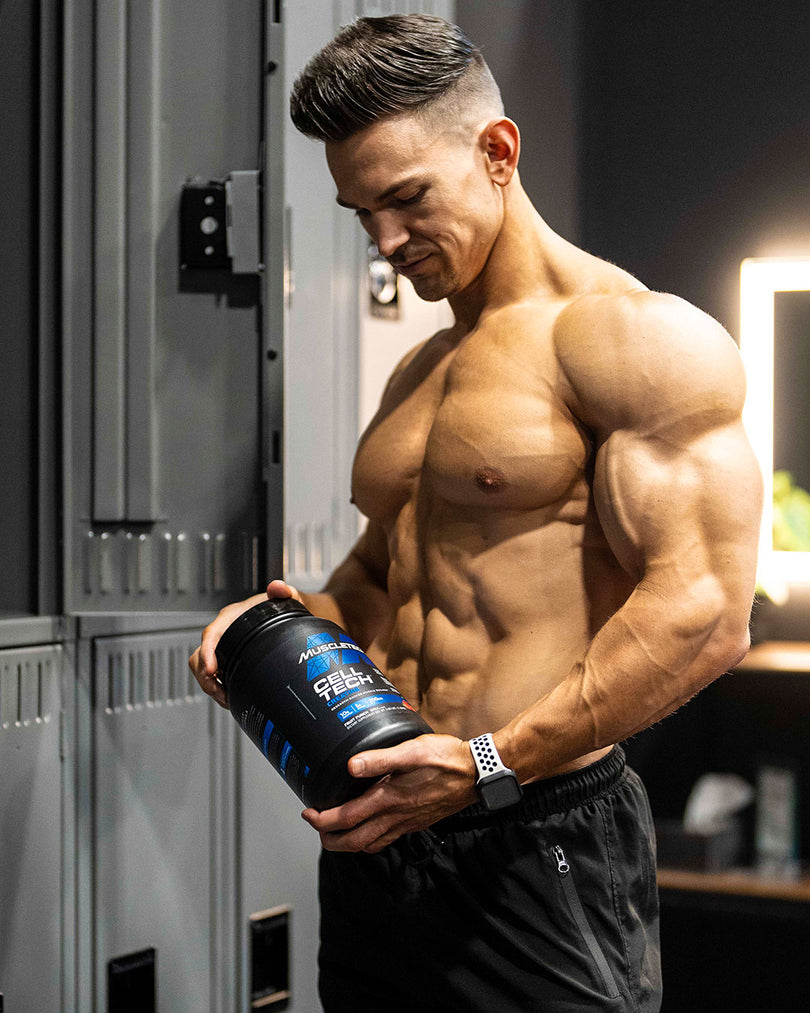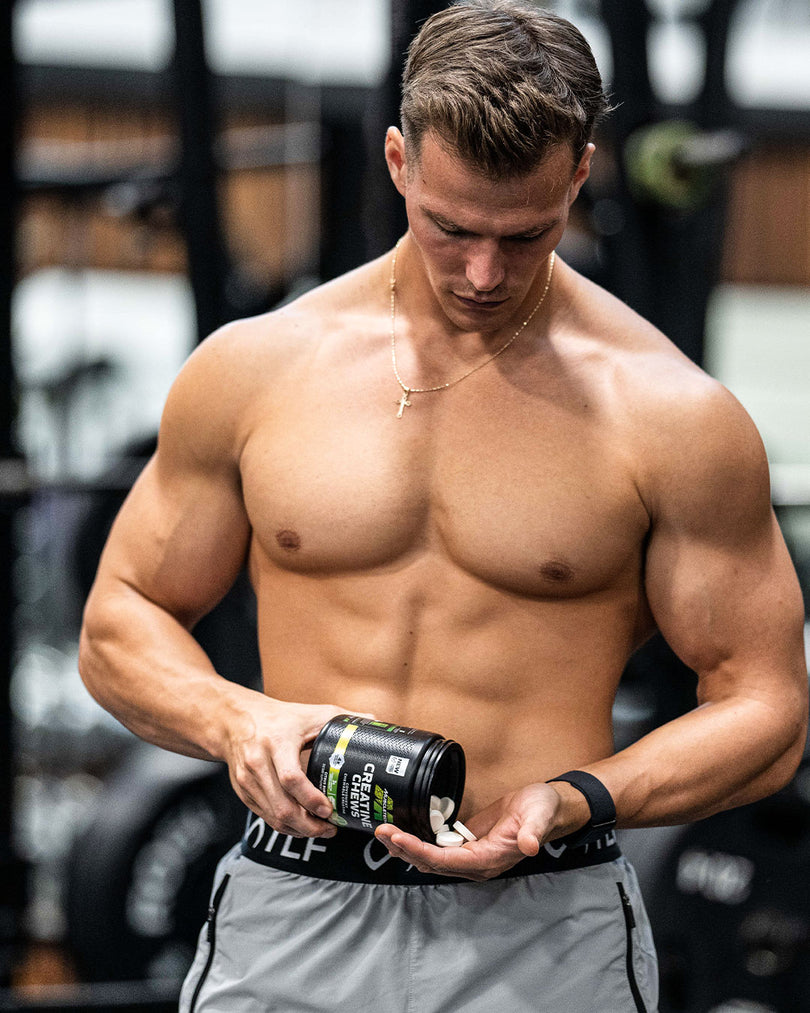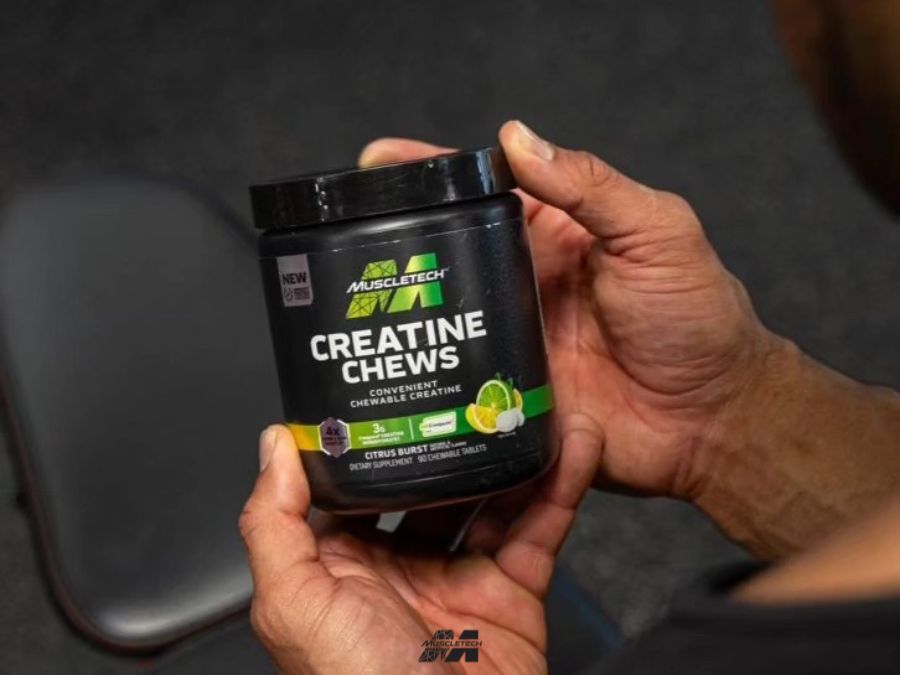What Happens When Creatine Hits the Bar? Unravel the Mystery of Alcohol's Impact on Creatine Supplementation
Creatine is one of the most well-known and most-studied supplements in fitness due to its ability to enhance muscle growth, strength, and performance in the gym. (1) However, it is common for people who use creatine to improve their training also wish to use alcohol socially, which may compromise performance pursuits.
In this article, we will dive into the mechanisms behind creatine supplementation, alcohol metabolism, and their relationship with one another once ingested. We'll cover the consequences of alcohol consumption on your training and offer strategies that can help strike a balance between the two.
So that you can maintain your training while also enjoying drinks with friends occasionally.
Table of content
Understanding Creatine Supplementation
Creatine is a naturally occurring substance found primarily in muscle cells and is essential in energy metabolism. (1) It is mainly involved in producing adenosine triphosphate (ATP), also known as the body's energy currency, and helps facilitate movement.
Creatine plays a significant role in promoting energy for high-powered activities such as sprinting, weightlifting, and other high-intensity activities. (1)
Most people will maintain a creatine saturation in the muscle cells at about sixty to eighty percent if they consume red meat regularly. (2) However, you can bring this level up to one hundred percent with consistent supplementation. (2) Maintaining these stores helps to sustain high-intensity muscle contractions and delay fatigue. (2)
For athletes, creatine supplementation is beneficial. Research has repeatedly shown that it can enhance muscle growth, strength, and athletic performance when combined with a resistance training program. (1) It also helps to improve important athletic characteristics such as sprint speed and power production. (2)
Also Read: Should I Take Creatine on Rest Days?
Forms of Creatine
There are several forms of creatine, but creatine monohydrate is most commonly supplemented and researched. (2) Other forms of creatine include creatine hydrochloride and creatine ethyl ester, which claim to have fewer side effects, such as GI distress.
Yet creatine monohydrate remains the most effective and affordable to date.
Supplementation Protocol
To increase muscle creatine stores rapidly, a typical dosing regimen is to supplement with creatine monohydrate via a loading phase which consists of 4 x 5g dosages (20g total) over 5-7 days.(2) This is followed by an ongoing maintenance phase of 3-5g per day to maintain saturation of creatine stores. (2)
After each training day, you may also benefit from taking it with juice or other carbohydrate-rich liquids. (2)
Understanding Alcohol Metabolism
Alcohol, also known as ethanol, is a central nervous system depressant commonly found in drinks such as beer, wine, and liquor. After you consume alcohol, it is rapidly absorbed into the bloodstream via the small intestine, followed by several different processes that occur in the body being impacted. (3)
Alcohol is broken down in the liver through various enzymes, such as alcohol dehydrogenase (ADH) and aldehyde dehydrogenase (ALDH). (3) As the process of alcohol metabolism begins, ADH will convert the alcohol into another toxic compound known as acetaldehyde, which is broken down by ALDH into acetate. (3)
Lastly, acetate is broken down into water and carbon dioxide and ultimately expelled from the body. (3) The effects you experience from alcohol consumption are a result of an imbalance of accumulation of acetaldehyde and the rate at which the liver can process and expel it. (3)
Also Read: When to Take Creatine: Dos and Don'ts
Negative Effects on Fitness
There are numerous ways in which alcohol consumption can negatively impact your fitness. First, alcohol is a diuretic, meaning that consuming it will lead to an increase in urine production and, ultimately, dehydration. (4)
Dehydration can disrupt your muscle function and your ability to deliver nutrients to recover muscle tissue and impair your gym performance. (4)
Consuming alcohol can also disrupt your ability to achieve an optimal night's sleep, reduce testosterone levels with repeated use ( ), and reduce post-exercise muscle protein synthesis (MPS). MPS is the process by which muscles recover and grow after training. (5)
Impairing MPS will lead to stunted strength, muscle mass, and performance gains. All of these are potential benefits of supplementing with creatine. (5)
Lastly, although moderate alcohol consumption may not have massive detrimental effects on performance or your health, excessive alcohol consumption definitely can. Particularly concerning liver damage, as the liver is heavily involved in alcohol processing.
Also Read: How Much Water Should I Drink While Taking Creatine?
The Interaction between Creatine and Alcohol
Due to the popularity of both creatine supplementation to enhance exercise gains and the frequent use of alcohol in social settings, their interaction has received increased attention in recent years.
Although the exact effect that alcohol can have on creatine supplementation in the real world can be multifaceted, the adverse effects that you can experience center around many of the mechanisms and effects we've mentioned thus far.
Creatine Absorption Storage & Usage
Some studies suggest that consuming alcohol can disrupt your body's ability to absorb the nutrients you consume. (6)
This is a problem as the mechanism of creatine exercise improvement capabilities relies on it being accumulated in the muscle tissue. (2) The effectiveness will drop significantly if the creatine you ingest is not absorbed and utilized.
Also Read: Can I Mix Creatine with Pre-Workout?
Creatine and Alcohol-Related Dehydration
A significant cause for concern with consuming creatine and alcohol is the impact that it has on dehydration. (5) The increased urine output after consuming alcohol expels water from the body faster than it usually would, as well as expels valuable electrolytes with it. (5)
Creatine can promote water retention during supplementation, therefore increasing hydration demands. (7) Increased urine output and loss of electrolytes such as sodium, potassium, and magnesium, and calcium can decrease cellular function and muscle contraction.
This could reduce the ATP regeneration effects creatine supplementation can provide as creatine transport is supported by sodium. (7) This can reduce your performance in the gym and blunt the compounding training effect that creatine has over time.
When supplementing with creatine, maintaining adequate hydration levels is already a priority for the above reasons.
But when alcohol consumption is included, the demands for regular hydration and electrolyte maintenance go up significantly. Not doing so will dramatically affect the effectiveness of your creatine.
Also Read: Should I Load Creatine or Not?
Alcohol's Effect on Muscle Mass and Strength
Regularly consuming alcohol can also have detrimental effects on muscle mass and strength, even without supplementing creatine. (5) This is primarily related to its impact on muscle protein synthesis and your ability to recover from training and build new muscle tissue. (4)
After a night of heavy drinking or with chronically high alcohol consumption, essential muscle-building substances such as mTOR are inhibited, which plays a critical role in initiating MPS. (4) Additionally, anabolic hormones such as testosterone, is lowered. (5)
Finally, nutrient delivery can be impacted by alcohol consumption, which can hinder the delivery of essential amino acids (EAAs) that are needed to repair muscle tissue. (5)
An indirect way alcohol consumption can impact muscle mass and strength is the need for more high-quality nutrition that occurs with drinking. It is common for available nutrition in social drinking settings to be subpar from a quality protein and calorie standpoint.
During periods of heavy drinking, the body may become deprived of the nutrients it needs, which will promote a catabolic state.
Combining the two substances will decrease the effectiveness of the creatine you consume based on the factors above. Therefore, to maximize your training gains from creatine, think twice before reaching for a glass of beer, wine, or liquor.
Also Read: What Foods Contain Creatine?
Strategies for Supplementing Creatine And Using Alcohol
Although it is clear that consuming alcohol while supplementing with creatine will take away from its effectiveness, many people won't want to abstain from occasional drinks with friends. If this is you, then here are some strategies you can employ to mitigate these effects.
Also Read: What Does Creatine Do for Women?
Timing
To decrease the impact that alcohol has on creatine effectiveness, consider ingesting your creatine several hours away from when you have your first drink. This could help maximize absorption and creatine saturation.
Hydration
Since alcohol is a diuretic and creatine operates most efficiently in a hydrated environment, ensure that you consume adequate water before, during, and after. A good rule of thumb is to drink fifty percent of your body weight in ounces of water. Consider taking an electrolyte supplement to maintain electrolyte balances.
Also Read: Does Creatine Make You Gain Weight?
Moderation
Moderation of alcohol consumption is crucial in itself. However, creatine supplementation can add another layer of importance. By preventing binge drinking episodes or frequent consumption, you can mitigate how harmful the effects are on creatine.
Non Alcoholic Alternatives
If you value spending time in social settings with friends but want to maintain your training and fitness, consider non-alcoholic beverages. These could be non-alcoholic beers, soft drinks, or "mocktails". Opting for these allows you to partake in social activities without the discomfort of not enjoying a drink.
Wrapping Up On Creatine and Alcohol Use
It is no secret that alcohol can have negative impacts on the body as it is classified as a toxic substance. But, it is also commonplace for it to be consumed by friends and family during celebrations and other social settings.
You may choose to abstain from consuming any alcohol consumption to maximize your overall fitness goals. You may also opt to use the strategies I've mentioned above to mitigate the adverse effects of alcohol and find a balance between the two.
Either approach works as well, as you know the effects alcohol can have and are aware of the consequences related to your training.
You can now use this article as a guide for whichever route you take. If you choose to drink alcohol, ensure that it is done responsibly. Be sure to put the strategies we've discussed here into practice if you wish to maximize your creatine supplementation.
References:
- Chrusch, M. J., Chilibeck, P. D., Chad, K. E., Davison, K. S., & Burke, D. G. (2001). Creatine supplementation combined with resistance training in older men. Medicine and science in sports and exercise, 33(12), 2111–2117. https://doi.org/10.1097/00005768-200112000-00021
- Kreider, R. B., Kalman, D. S., Antonio, J., Ziegenfuss, T. N., Wildman, R., Collins, R., Candow, D. G., Kleiner, S. M., Almada, A. L., & Lopez, H. L. (2017). International Society of Sports Nutrition position stand: safety and efficacy of creatine supplementation in exercise, sport, and medicine. Journal of the International Society of Sports Nutrition, 14, 18. https://doi.org/10.1186/s12970-017-0173-z
- Cederbaum A. I. (2012). Alcohol metabolism. Clinics in liver disease, 16(4), 667–685. https://doi.org/10.1016/j.cld.2012.08.002
- Vella, L. D., & Cameron-Smith, D. (2010). Alcohol, athletic performance and recovery. Nutrients, 2(8), 781–789. https://doi.org/10.3390/nu2080781
- Lakićević N. (2019). The Effects of Alcohol Consumption on Recovery Following Resistance Exercise: A Systematic Review. Journal of functional morphology and kinesiology, 4(3), 41. https://doi.org/10.3390/jfmk4030041
- Bujanda L. (2000). The effects of alcohol consumption upon the gastrointestinal tract. The American journal of gastroenterology, 95(12), 3374–3382. https://doi.org/10.1111/j.1572-0241.2000.03347.x
- Antonio, J., Candow, D. G., Forbes, S. C., Gualano, B., Jagim, A. R., Kreider, R. B., Rawson, E. S., Smith-Ryan, A. E., VanDusseldorp, T. A., Willoughby, D. S., & Ziegenfuss, T. N. (2021). Common questions and misconceptions about creatine supplementation: what does the scientific evidence really show?. Journal of the International Society of Sports Nutrition, 18(1), 13. https://doi.org/10.1186/s12970-021-00412-w









